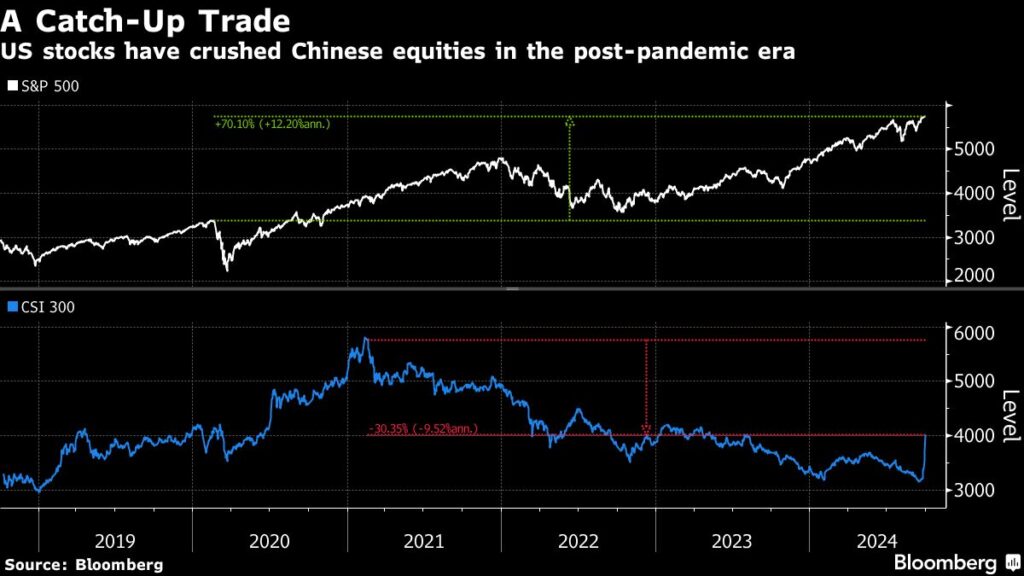(Bloomberg) — Back in the emerging-market heyday, the sudden frenzy that has pushed Chinese equities to a bull run would be big news on Wall Street.
Most Read from Bloomberg
Yet this time round, the stock-market revival in the world’s second-biggest economy has barely registered with US traders, underlining both China’s limited role as an engine for America’s economy and skepticism that Beijing policy makers will be able to fix deep-seated growth woes.
The lack of excitement was palpable in Monday trading. While the CSI 300 Index jumped more than 8%, the S&P 500 slipped before a late-day bounce helped the gauge avoid a US-China divergence that, by one measure, would have been the largest since the 2008 financial crisis. As the Chinese benchmark surged 26% over six sessions, the American index rose by a relatively meager 1%, underscoring how traders in US assets are largely shrugging off the gambling spirits in Asia.
That’s not say foreign investors are sitting on their hands. A slew of ETF investors have rushed to replenish US-listed funds that ride Chinese large-cap companies, technology shares and more, after a spate of policy-easing measures in the nation, including the relaxing of rules on home buying.
Yet the newfound market enthusiasm remains a largely regional affair. And it’s the latest US-China market gulf that’s flared in recent years when Big Tech fever pushed US equities to fresh records, just as China struggled to keep its markets afloat amid a big debt overhang.
“Is this going to change the trajectory of growth in the US in a meaningful way? And the answer really is no,” Mike Wilson, Morgan Stanley’s chief US equity strategist, said on Bloomberg TV, referring to China’s stimulus. “We need to see the labor market get better in the US.”
US stocks have crushed their Asian counterparts again this year – and for most of the post-pandemic era, for that matter – while Beijing’s efforts to jumpstart the economy has been met with persistent doubts after repeated policy failures. And even if the nation’s leaders pull off the feat, how much America will benefit remains an open question given the fact its output is notably less dependent on trade growth than many of its advanced-economy peers, while China was just surpassed by Mexico as the top US trading partner.
Now with the S&P 500 fetching a near-record valuation premium recently over its Chinese counterparts, investors are turning their focus to domestic factors to determine the outlook, including the continued resilience of American consumers and the Federal Reserve’s interest rate-cutting trajectory.
Meanwhile Chinese stocks have rallied big time this month with indexes from Hong Kong and Shanghai occupying the top three spots among 92 benchmarks around the world tracked by Bloomberg.
It’s an epic shift in sentiment given the country’s equities were ranked last year among the worst, and once even dubbed “uninvestable.” Fueling the latest gains were short sellers, who had bet against the market and were forced to buy back shares to limit losses.
Still it’s early days yet. When measured from its 2021 high, the CSI 300 remains 30% lower. And the challenges facing the nation — from a property crisis to deflation, slowing growth and rising youth unemployment — aren’t going away soon.
“Whether the sweeping moves will rescue the nation’s deeply distressed real estate sector and ease consumer malaise is uncertain,” said Gina Martin Adams, Bloomberg Intelligence’s chief equity strategist. “China’s late-week moves have yet to lift the broader earnings outlook for emerging markets for 2024 or 2025 as analysts and investors gauge the impact.”
By contrast, US markets have rallied hard all year, thanks to the S&P 500’s steady march higher amid the frenzy over artificial intelligence, and as the Fed manages to tame inflation without snuffing out growth, at least for now. The index has notched more than 40 record highs this year, sitting 70% above its pre-pandemic peak. And earlier this month, the S&P 500 was traded at 25 times earnings — two times as high as its Chinese counterpart.
To Scott Rubner, managing director for global markets and tactical specialist at Goldman Sachs Group Inc., equity gains may be hard to come by in the US until after November’s presidential election. That may well help explain why American investors have sought out cheaper investing styles of late including Chinese ETFs.
With fear of missing out increasing in China, the “S&P is not the horse to ride this October,” Rubner wrote in a note to clients Monday.
(Updates with Monday’s closing prices)
Most Read from Bloomberg Businessweek
©2024 Bloomberg L.P.
Read the full article here

